LIVE: Vote counting continues as Cameroon awaits its next president

Follow Global South World's live coverage of Cameroon's October 12, 2025, elections, as over 8 million voters go to the polls in an election that could see the world's oldest president, Paul Biya, 92, extend his over four decades of rule until months shy of his 100th birthday.
LIVE UPDATES
This concludes our live coverage of the October 12, 2025, Cameroon elections. Polls have been closed for over 4 hours across various centres in the country as vote counting continues. According to reports, the Constitutional Council will declare the official outcome by October 26.
21:08 GMT+1: 3 hours after polls closed, vote counting still continues across the various polling stations
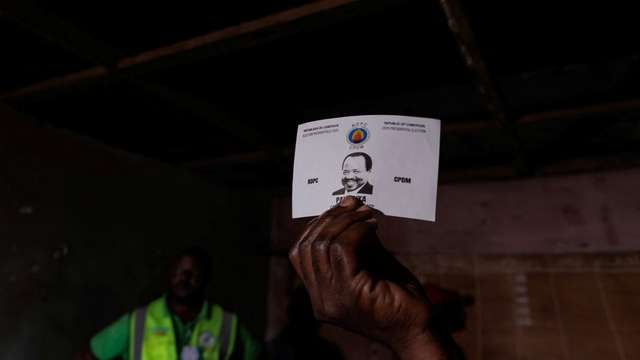



20:39 GMT+1: At Buea's St. Therese Nursery and Primary School, where the results from all ten polling places have not yet been signed, dozens of voters are still camped out. According to reports, officials have offered opposition representatives blank sheets to sign instead of allowing them to sign result sheets. Voters declare that until the results are signed, they will not depart.
19:25 GMT+1: Half an hour after polls close, reports of voter exclusion in multiple polling centres surface, casting doubt on vote counting transparency
18:00 GMT+1: Voting ends. Counting — and waiting — begins for the people of Cameroon.
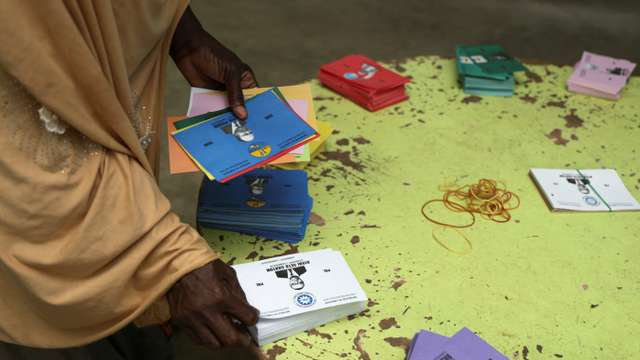


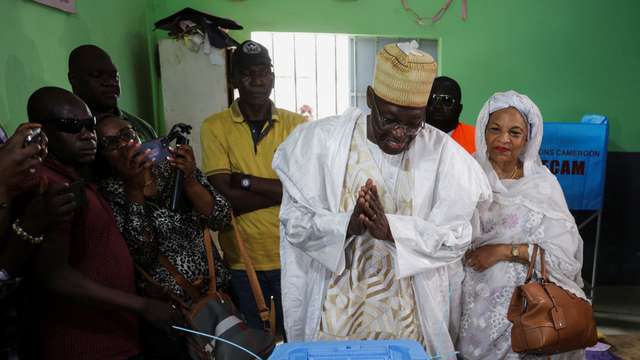
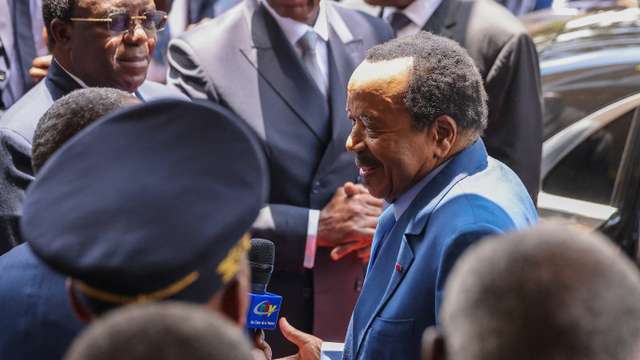
17:30 GMT+1: Unofficial results from overseas polling stations show Issa Tchiroma Bakary securing a sizable lead over other contenders. Counts that have been reported so far were from Saudi Arabia, Kenya and UAE.
17:00 GMT+1: Cameroon National Citizens’ Movement candidate Jacques Bouhga Hagbe keys in his vote at the Government Bilingual Primary School Essos voting centre in Yaounde. He ran on a platform of solving Cameroon's economic woes, considering his experience as an economist with the International Monetary Fund.
16:50 GMT+1: UNIVERSE party's Akere Muna Tabeng votes at the Government Bilingual Primary School Bastos in Yaounde. His candidacy had been cut short when he decided to back Bouba weeks before the election in an attempt to front a "consensus candidate" against Biya.
16:40 GMT+1: Allegations of electoral fraud and ghost voters are swirling online. This is crucial in a country that has been described by the International Foundation for Electoral Systems as practicing "electoral autocracy," or when a government conducts elections regularly but fails to meet standards for democracy, freedom and fairness.
16:30 GMT+1: Situation in voting stations abroad, as some voters allege irregularities and rue strict rules at the embassy.
16:20 GMT+1: Presidential bet Cabral Libii Li Ngue Ngue of the Cameroon Party for National Reconciliation casts his vote. A former journalist, Libii is a member of the Cameroonian parliament and is one of the youngest candidates at 45.
15:10 GMT+1: Hiram Iyodi, the youngest presidential candidate this year at 38, casts his ballot in New Bell, Douala II Municipality. Running under the banner of the Cameroonian Democrats Front, Iyodi brings youth to the presidential race, whose median age is nearly 60.
14:50 GMT+1: Lone female contender Hermine Njoya casts her vote at Njinka Public School in Foumban. Her candidacy marks only the third time a female has eyed the highest government position in Cameroon.
14:20 GMT+1: Presidential candidate Joshua Osih of the Social Democratic Front votes at Lycée Joss in Douala. At 56 years old, Osih is one of the leaders of Cameroon's main opposition party. He is also the first Anglophone Cameroonian to serve as a Parliamentarian in Douala, the country's economic capital.
14:10 GMT+1: Voters share their experiences and hopes after casting their votes. More than 8 million have registered to vote this year, which equates to less than 30% of Cameroon's 29 million population.
13:50 GMT+1: Lawyer and politician Maurice Kamto casts his vote. He had been widely considered the strongest challenger to Biya but was excluded from this year's list of candidates after his party, the Movement for the Renaissance of Cameroon, fell into disarray due to internal disputes that led to rival endorsements.
13:20 GMT+1: Donning his signature blue suit, longtime President Paul Biya, who is also in the running this year, casts his vote at a polling station in Yaounde, the capital of Cameroon. Biya is accompanied by his wife, Chantal.

13:00 GMT+1: Opposition candidate Issa Tchiroma Bakary of the Cameroon National Salvation Front votes in Garoua. A former Biya ally, the 76-year-old former Cameroonian employment chief is seen as one of the most formidable opposition figures in the election, with a number of political parties backing his candidacy.
12:50 GMT+1: Presidential candidate Cabral Libii sounds the alarm over an alleged election violence incident in Hile Alifa B Public School, where a mayor supposedly smashed the phone of a representative from the Cameroon Party for National Reconciliation, who "opposes fraud."

11:20 GMT+1: Opposition candidate Bella Bouba Maigari seals his vote at the polling station in Bascheo. A former Cameroonian prime minister, Bouba has had a close relationship with Biya, until he resigned in June to launch his candidacy against the incumbent leader. He is considered to have one of the strongest chances to topple Biya as candidates Akere Muna and Ateki Seta Caxton both withdrew from the race to back him.
11:20 GMT+1: Bernard Okalia Bilai, the governor of Cameroon's southwest region, casts his vote. Bilai has been a key figure in managing the conflict between the country's Anglophone and Francophone regions, as well as in addressing separatist movements.

11:15 GMT+1: Presidential candidate Serge Espoir Matomba of the United People for Social Renovation party casts his vote.
11:00 GMT+1: Reports from the ground indicate less than favorable weather conditions hounding Cameroon's elections. Despite this, no changes are expected or have been announced by the Elecam.
09:30 GMT+1: Biya is expected to vote today at the Government Bilingual Primary School Bastos in Cameroon's capital, Yaounde. He is registered there with his wife, Chantal Biya.
08:00 GMT+1: Cameroon officially begins one of the most consequential elections in its history. Polling precincts will be open until 6 p.m. for the more than 8 million voters to cast their ballots.
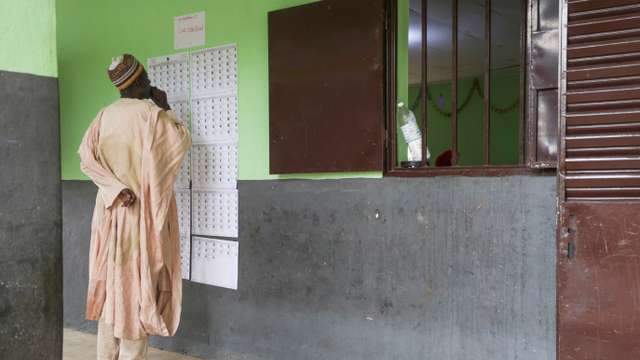
Last-minute support for Biya, Tchiroma
Hours before polls opened, both President Paul Biya and opposition contender Issa Tchiroma secured crucial last-minute endorsements, as several political groups from across Cameroon’s spectrum declared their backing.
Tchiroma, one of the opposition’s “consensus candidates” running under the Cameroon National Salvation Front, gained the support of seven more parties after they withdrew their endorsement of the lone female contender, Hermine Njoya, on the evening of October 11.
“We believe he has genuinely repented and now embodies the change Cameroonians seek,” coalition spokesperson Shewa Jestel said.
But the endorsement underscored divisions within the opposition. The coalition criticised fellow opposition candidate Bella Bouba — also a former Biya ally — calling him an “extension of the regime.” Bouba had earlier won the backing of Akere Muna and Ateki Seta Caxton, who both pulled out of the race to support him.
Biya also drew fresh backing from 48 political parties, bolstering his push for another seven-year term — one that would extend his rule to half a century.
Cameroon warns opposition against ‘illegal’ election result announcements
Cameroon’s Minister of Territorial Administration, Paul Atanga Nji, warned that any attempt by opposition candidates to independently publish election results will be treated as “high treason” and will be addressed through “retaliatory measures.”
Nji made the remarks on Friday, 2 days before the October 12 vote.
Background
ELECAM, Cameroon's independent electoral body, reports that 8,010,464 voters, including 3,716,567 women and 4,293,897 men, are eligible to cast ballots at 31,653 polling stations.
34,411 out of the total registered voters are citizens abroad, dispersed across 108 polling stations.
Contenders and outcasts
This year’s election pits Biya against 11 candidates, drawn from a record 81 hopefuls. The Constitutional Court disqualified several bids, including that of Hilaire Marcaire Dzipan of the Progressive Movement (MP), whose initial approval by the election body was later revoked.
Another major exclusion was Maurice Kamto of the Movement for the Renaissance of Cameroon, widely regarded as Biya’s strongest challenger. Kamto, who came second in 2018 with 14% of the vote to Biya’s 71%, was barred from running.
Last month, the divided opposition pulled together behind two former ministers: Bello Bouba Maigari, once prime minister, and Issa Tchiroma Bakary, a former employment chief. Both men were once allies of President Paul Biya, the 92-year-old who is seeking an eighth term that would extend his rule into its 50th year. Despite questions about the integrity of the vote, Biya remains among the leading contenders.
Bouba’s candidacy is backed by the UNIVERSE Party and the Liberal Alliance Party (PAL), alongside his own National Union for Democracy and Progress (UNDP). Tchiroma, meanwhile, has won support from other opposition figures, including Anicet Ekane of the Manidem Party.
Consolidation has long been seen as key to unseating Biya. Yet the loose unity now emerging has also raised concerns: rather than concentrating support, two northern candidates may divide it.
“Both say they will fight corruption and introduce structural reforms, but their strongest attribute seems to be their origins,” Cameroonian journalist Tony Vinyoh told Global South World. “They’re both from Cameroon’s three northern regions, the biggest voting bloc in the country. That has also led to fears they’ll split the vote and offer Biya victory.”
Bouba’s coalition only came together after Akere Muna and Seta Carson withdrew their own candidacies to back him. It is the first serious attempt in years to rally the opposition behind one figure after repeated failures to find a consensus.
The following candidates have been confirmed and validated for the October 12 vote:
Paul Biya (Cameroon People’s Democratic Movement)
Ateki Seta Caxton (Alliance Liberal Party)
Bella Bouba Magari (National Union for Democracy and Progress)
Jacques Bougha Hagbe (Cameroon National Citizen Movement)
Issa Tchiroma Bakary (Cameroon National Salvation Front)
Hiram Samuel Iyodi (Cameroonian Democrats Front)
Pierre Kwemo (Union of Socialist Movements)
Cabral Libii Li Ngue Ngue (Cameroon Party for National Reconciliation)
Serge Espoir Matomba (United People for Social Renovation)
Akere Tabeng Muna (Independent)
Joshua Nambangi Osih (Social Democratic Front)
Hermine Patricia Tomaino Epse Ndam Njoya (Cameroon Democratic Union)
Since the list’s release in July, the race has shifted. Akere and Seta have withdrawn to back Bouba, one of the leading opposition figures to have consolidated support. Another contender, Tchiroma, secured backing from the Manidem Party.
Both Bouba and Tchiroma are now seen as the top opposition candidates.
Biya’s dominance
To grasp the scale of Biya’s dominance, one must look to Cameroon’s history.
Biya is only the country’s second president, succeeding Ahmadou Ahidjo, who led from independence in 1960 until resigning in 1982. Ahidjo’s decision to appoint Biya as his successor backfired when the new president later had him tried and sentenced to death — a penalty later commuted to life imprisonment.
Cameroon has never held a presidential election without Biya on the ballot. In 1984, he ran unopposed when Cameroon was still a one-party state. When multiparty elections were introduced in 1992, Biya won with 40% — his narrowest margin. His vote share has not fallen below 70% since.
The world's oldest president, Cameroon's Paul Biya, is chasing an eighth seven-year term. But, there's a renewed opposition blocking his way.
Here’s how Biya won in all the elections he has participated in:
1984 - 100% of votes
1992 - 39.98% of votes
1997 - 92.57% of votes
2004 - 70.92% of votes
2011 - 77.99% of votes
2018 - 71.28% of votes
However, these numbers aren’t to be taken at face value. Nearly all elections have been mired in allegations of vote-rigging. As the International Crisis Group noted, “Given the likely magnitude of the election irregularities, it is almost impossible to determine what percentage of the vote each candidate really won.”
Cameroonian journalist Tony Vinyoh said such allegations have deepened public mistrust in the process.
“People don't trust the process,” he told Global South World. “I’ve talked to some parents, and they don't even want to register their kids.”
Out of a population of 28.3 million, only 8.2 million are registered to vote. Turnout has steadily declined: from 80% in 2004 to 68% in 2011, and just 54% in 2018, according to the International Foundation for Electoral Systems.
What’s at stake
For many, the October vote is about more than leadership — it’s about ending a culture that stifles dissent, discourages meritocracy, and sustains political dynasties as enduring as Biya’s.
“Stability, in Cameroon’s current context, is a deeply misleading term,” Cameroonian journalist Amindeh Atabong wrote in his column for Global South World. “It masks the profound erosion of civil liberties, the stifling of political dissent, and the lack of political will to reform electoral norms in order to sustain one man’s grip on power.”
Cameroon’s population is young, but its leadership is ageing. As problems in education, infrastructure, and the economy deepen, public frustration grows.
“People are worried about the state of their roads, the standards of education. There are parents who are worried about feeding their kids and sending them to school. They are worried about the training they will get in university and whether the training will be useful,” he said.
Elections like that of October 12 give Cameroon the appearance of democracy, but many say the reality remains far removed from its promise.
“Cameroon holds regular elections. It maintains a multiparty system. It boasts a constitutional council and an independent electoral body. But these structures have been hollowed out, their purpose repurposed to preserve a singular political dynasty. There is no viable path to power that doesn’t first pass through the gate Biya has locked shut,” Atabong said.
“Unless opposition leaders find a way to unify, unless citizens reclaim the democratic space stolen from them, Biya’s eighth term will not be his last.”
As Cameroonians prepare to cast their votes, the stakes extend far beyond the ballot box. The election has become a reckoning with decades of stagnation — a test of whether a new generation can reclaim the promise of democracy from the world’s oldest ruler, or whether the familiar machinery of power will once again tighten its hold.
This story is written and edited by the Global South World team, you can contact us here.